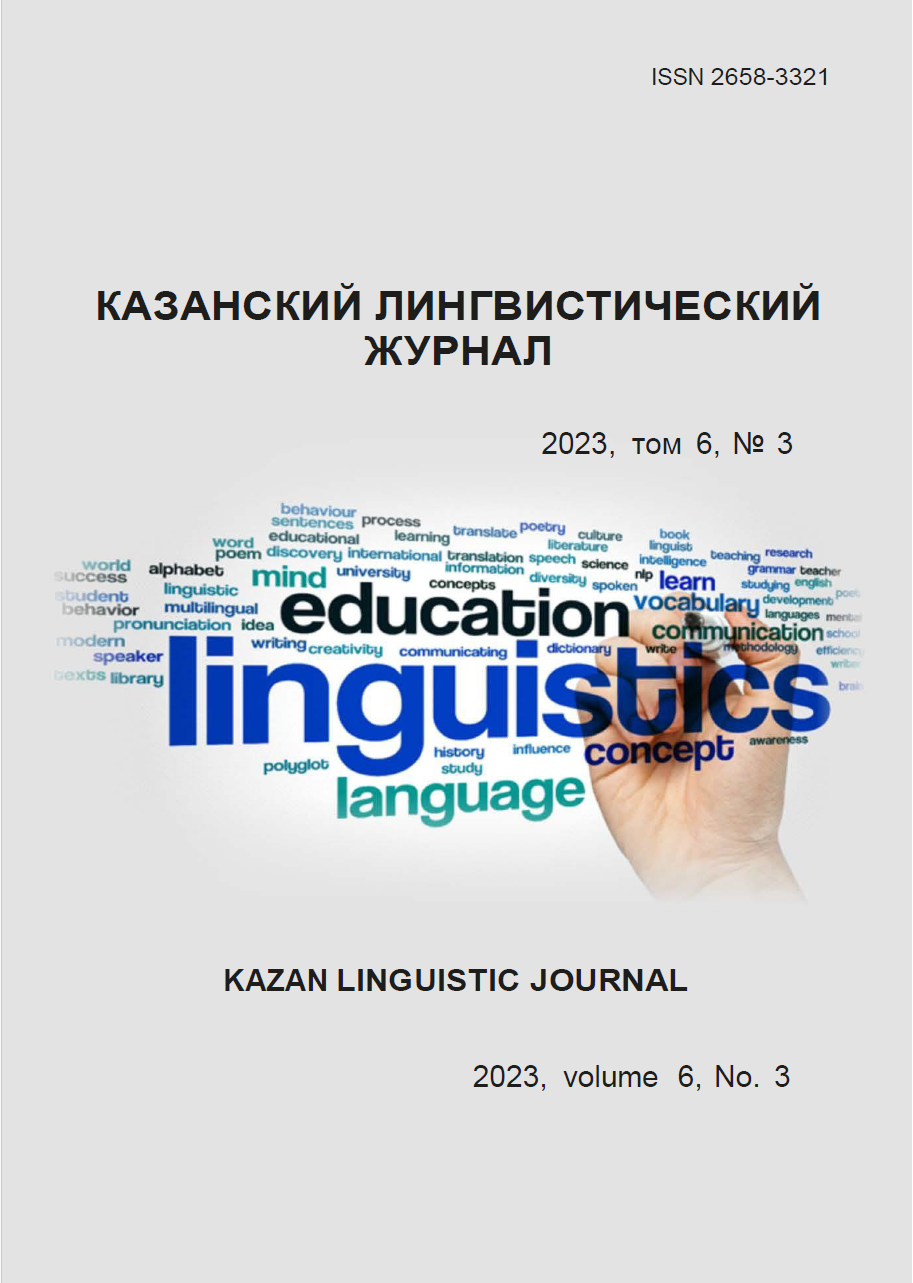Lexical transformations in the translation of Socio-political terms (based on the material of the online publication “The guardian”)
https://doi.org/10.26907/2658-3321.2023.6.355-365
Keywords:
political discourse, political term, English, Russian, translation, lexical transformationsAbstract
The abundance of political speeches in recent years and the existence of numerous texts of a socio-political nature in direct connection with the life of the people have made it possible to distinguish a separate type of discourse – political.Like any type of discourse, the political one has a set of specific characteristics: a list of various linguistic means, fixation of actual socio-historical realities, a special vocabulary, suggestive potential of political speeches, mass character, terminology, etc. One of the most obvious signs of political discourse is the presence of political terms in it. Under the term in modern linguistics, it is customary to understand a word or phrase of a highly specialized topic.The translation of political terms often determines the concept and strategy of translating the entire political text.Taking into account the fact that there are significant differences not only between Russian and English, but also between the structure of political systems, media texts are forced to use lexical transformations when translating political terms.We have analyzed more than one hundred and fifty examples of the translation of terms presented in the online version of the British edition of The Guardian for 2018. From among the lexical transformations, we have identified the following: calcification, concretization, descriptive turnover, transliteration, omission, semantic development and transcription. The most frequent methods of translation from English into Russian are calcification, transcription and concretization.The predominance of these transformations is due to the fact that socio-political vocabulary is more international, therefore, such translation methods allow to level out national factors of information perception and emphasize the objectivity of the translator.In particular cases of substitution, omission, concretization or use of descriptive phrases, the translator is more guided either by taking into account the grammatical features of languages (primarily the absence of equivalent grammatical constructions), or is guided by the historical experience of the Russian people and the adequacy of the perception of the situation through the prism of the national worldview.
References
References
Political Linguistics. Available from: https://politlinguistika.ru/ [accessed 09/09/2022]. (In Russ.)
Zabelo T.V. Linguistic specificity of political discourse: Abstract of the thesis. ... can-didate of philological sciences. Moscow; 2012. (In Russ.)
Kuzmina S.V. Political discourse as an integral part of political communication. Izvestiya Saratovskogo gosudarstvennogo universiteta. Novaya seriya. Seriya: sotsiologiya, politologiya. 2011; 11(2):54–56. (In Russ.)
Kryuchkova T.B. Features of the formation and development of socio-political vocab-ulary and terminology. M.: Nauka; 1989.
The Guardian. Available from:https://www.theguardian.com/commentisfree/2018/mar/07/russia-yet-to-recover-from-stalin-era [accessed 09/09/2022]. (In Eng.)
The Guardian. Available from:https://www.theguardian.com/commentisfree/2018/mar/07/russia-stalin-putin-guilt-victims [ac-cessed 09/09/2022]. (In Russ.)
Sheigal E. I. Semiotics of political discourse: Author. dis. … Dr. Philol. Sciences. Volgograd; 2000. Available from: www.lib.ua-ru.net/diss/cont/94853.html [accessed 07.10.2022]. (In Russ.)
Schukin A.N. Linguodidactic encyclopedic dictionary: more than 2000 items. M.: Astrel: AST: Khranitel'; 2007. (In Russ.)
Kiyak T.R. Linguistic aspects of terminology. Ucheb. posobiye. Kyiv: UMKVO; 1989. (In Russ.)
Nesterova Ya.A., Chernukha T.V. Term and terminology. Political vocabulary. Izvestiya Tul'skogo gosudarstvennogo universiteta. Gumanitarnye nauki. 2008;(3):226–236. (In Russ.)
Geibatova N.A. Features of the translation of the socio-political lexicon. Philological Sciences in Russia and Abroad: Materialy IV Mezhdunar. nauch. konf. St. Petersburg: Own publish-ing house. 2016:76–79.(In Russ.)
Barkhudarov L.S. Language and translation (Issues of general and particular theory of translation). M; 2005. (In Russ.)






